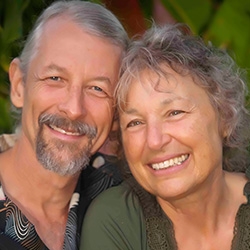

Search Results: safety
-
Research shows that couples with a secure bond experience arguments that are shorter, lower in intensity, and easier to recover from. Building and keeping a secure bond with your partner requires mindfulness and consistency: respond to what’s needed or supportive in a given moment; give them your full attention and affection in a spacious greeting; conveying care, consideration, and that they matter and are seen.
-
An anchor is something you turn your attention toward in order to interrupt reactivity and access a non-reactive, expansive perspective. Though it doesn't make the reactivity go away, it allow you the internal space to choose to not behave from reactivity. In this practice exercise learn more about anchors, plus how to create and use them.
-
Fear can show up as a thought or feeling. When we think and dwell on fear and get stuck, fear becomes our worst enemy. For a healthier approach, discover what brings up the emotion of fear by looking for the unmet need behind it. Next, identify the stimulus for the fear. Then satisfy the need(s) with suitable strategies. You can also reassure yourself based on the truth, evidence, and facts. Or ask a friend for support.
-
NVC practice is based on several key assumptions and intentions. When we live based on these assumptions and intentions, self-connection and connection with others become increasingly possible and easy, helping us contribute to a world where everyone’s needs are attended to peacefully.
-
Trainer Tip: In Compassionate Communication, we consider needs to be universal. That means that while we all have the same needs, such as for love, support, shelter, food, joy, caring, etc., we choose different ways to meet our needs.
-
- Share NVC in a way that keeps your group engaged
- Walk away with practical facilitation tips and 5 session outlines
- Know how to respond to nay-sayers
- Learn how to promote your work
-
Explore transforming prisons into healing spaces that build safety and community connection.
-
- Celebrate and nurture your relationship to the Earth — and each other!
- Explore your connections to family, partner, work, nature, self and more
- Discover new ways to grow in community and work together to make this world a better place
- Engage and immerse yourself in NVC while making new friends!
-
Trainer Tip: Control is a strategy, not a need, often confused as the reason for someone's actions.
-
Ask the Trainer: Can NVC transform group conflict? Trainer shares stories and answers the question.
-
Ask the Trainer: Is a confidentiality agreement typically used in NVC practice groups?
-
Explore what blocks us from speaking truth and how honesty builds trust and growth.
-
This explores four types of feedback: destructive, constructive, by demonstration, and dialogue.
-
Trainer Tip: Mary offers 3 foundational tips for making requests: positivity, specificity and doability.
-
Trainer Tip: Mary explains how Nonviolent Communication, a process that distinguishes needs from strategies is also itself, a strategy.
-
Trainer Tip: When we connect our feelings to our needs, we put ourselves in a postion to get our needs met and mourn when they aren't met. Here's a practical tip you can practice daily to improve the quality of your life.
-
It is the first day of December and it seems to me as if 2023 went by with a flash. I have felt deep despair about the growing division between people and the devastating impact it has had on human beings, all life in fact, including our planet. And, I have also experienced many moments of joy and satisfaction this year.
-
Conflict is a normal and natural part of life. To varying degrees, it happens whenever two or more people consistently spend time together. Resolving conflict effectively and peacefully, in a way in which all parties feel respected and valued, does not feel natural for those of us who grew up with punitive, adversarial, or avoidant approaches to conflict. Eric offers some tips for approaching conflict.
-
One of the most important things you can do to live a meaningful and rewarding life filled with vitality is reclaim your emotions. Eric offers a tip to reclaim your emotions, rescuing you from the numb and deadening state of “fine."
-
One of the premises in NVC is that behind all behavior and expressions are Universal Human Needs as the deeper motivators. And one of the key distinctions in NVC is that between Needs and Strategies. Try Alan Rafael Seid's exercise called "Peeling the Layers of the Onion, " a process for uncovering these needs — the deeper motivations — that underlie words and behaviors we may find disturbing or puzzling.

Quick Links
Subscription Preferences
Stay In Touch!
Looking for ways to keep up with NVC Academy news, get special offers, free resources, or words of inspiration? Here are five ways to stay engaged:




















